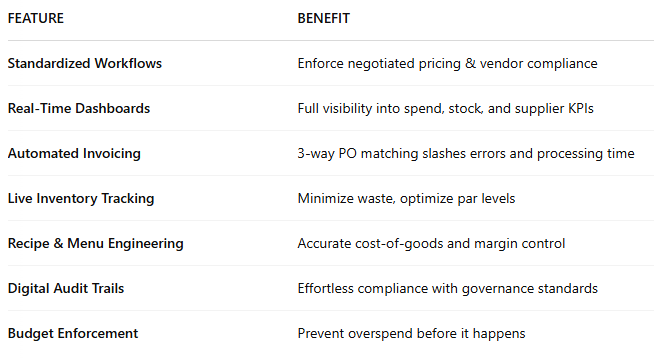
In the dynamic world of hospitality, managing procurement, inventory, and payments efficiently is crucial. Yet, many organizations still rely on spreadsheets for these complex processes, leading to inefficiencies and lost opportunities. With rising operational costs and stringent compliance requirements, it’s imperative for hospitality businesses to adopt modern solutions.
The Challenges in Hospitality Procurement
Hospitality operators face a range of procurement-related obstacles, often exacerbated by manual processes and disconnected systems:-
- Decentralized Procurement Processes: Without standardized workflows, businesses encounter inconsistent pricing and lack of control over spending.
- Inventory Imbalances: Manual stock counts result in spoilage, overstocking or stock-outs, eroding guest satisfaction and margins.
- Payment Bottlenecks: Paper invoices and email approvals create delays, errors, and strained supplier relationships.
- Budget Blind Spots: Without real-time spending data, enforcing budgets and forecasting spend becomes challenging.
A Spreadsheet’s Unseen Burden
Recent research highlights the peril of persisting with spreadsheets:
“Nearly 90% of spreadsheets contain some type of error.” Tadabase Blog – ( Sherman, 2024)
That single typo in a par stock calculation can cascade into thousands of Dollars in wasted inventory or emergency orders. Spreadsheets also:
- Lack Real-Time Updates, forcing teams to work on stale data.
- Hinder Collaboration, with version-control chaos when multiple users email around files.
- Fail at Scale, freezing or crashing as data grows.
- Offer No Audit Trail, exposing hotels to compliance risks under GDPR, SOX, and other regulations.
The shift to SaaS Procure to Pay solution
A modern P2P SaaS platform delivers an end-to-end transformation:

Expert Insights and Industry Trends
“Digital procure-to-pay (P2P) solutions are a no-brainer for the modern hotelier, streamlining procurement cycles and generating insights for more strategic purchasing decisions.”— Hospitality Financial and Technology Professionals (HFTP)
A recent research analysis underscores that high-performing hospitality companies overcome operational challenges by assembling the necessary data, processes, and technology to make informed decisions for their businesses and customers.
Despite clear advantages, many hotels in 2025 still rely on manual methods:
- Manual Data Entry & Paper Approvals: Handwritten invoices, spreadsheet tracking, and paper-based sign-offs remain prevalent, prone to errors and delays.
- Fragmented Systems: Disconnected platforms for sourcing, purchasing, invoicing, and payments create data silos and complicate decision-making.
- Limited Digital Adoption: Although procurement departments aim for 72% digitalization by 2025, many operators lag behind in fully embracing automated solutions. (HospitalityNet)
The complexity of hospitality procurement has been a well-known industry challenge… hotel brands needed one reliable system of record to reduce manual processes, improve reporting, and boost profitability.
A Hotelier Middle East survey found that one-third of hospitality businesses do not use any procurement management system, with many relying on self-made spreadsheet tools.
According to the Journal of Hotel & Business Management, over 80% of hotels that implemented e-procurement reported improved efficiency, and adopters achieved cost savings of up to 40% on goods and services.
结论
In an era where operational efficiency and compliance are paramount, relying on spreadsheets is no longer viable. Implementing a modern Procure-to-Pay SaaS solution not only streamlines procurement processes but also delivers the visibility and control necessary to thrive in the competitive hospitality landscape.
Author: Leo Costa, Solution Consultant, BirchStreet